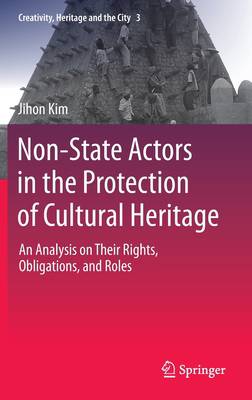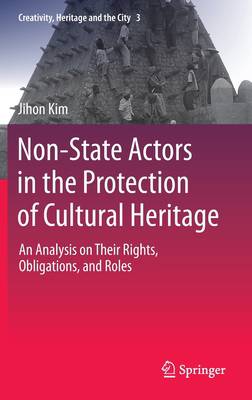
- Retrait en 2 heures
- Assortiment impressionnant
- Paiement sécurisé
- Toujours un magasin près de chez vous
- Retrait gratuit dans votre magasin Club
- 7.000.0000 titres dans notre catalogue
- Payer en toute sécurité
- Toujours un magasin près de chez vous
Non-State Actors in the Protection of Cultural Heritage
An Analysis on Their Rights, Obligations, and Roles
Jihon Kim
198,45 €
+ 396 points
Format
Description
This book provides a comprehensive overview of international cultural heritage law from the perspectives of non-state actors (NSAs). In keeping with the significant developments concerning the status and roles of NSAs in international law over the last century, NSAs such as communities, experts, NGOs, and international organizations have become important participants in the implementation of international cultural heritage conventions. Indeed, due to the emergence of new ideas on common heritage and cultural rights in the 20th century, international cultural heritage law has become inconsistent with States' claim to sole authority regarding the protection of cultural heritage. The author analyzes the texts of international cultural heritage conventions, as well as their operational texts, to track essential changes in the rights, obligations, and roles of NSAs since the mid-20th century. Practical cases on the status and roles of NSAs are introduced to glean empirical ideas and facilitate an in-depth understanding of their effectiveness. The analysis reveals that NSAs do have certain rights and responsibilities concerning the implementation of cultural heritage conventions, and their roles have been increasingly recognized. At the same time, however, discrepancies between text and practice can be observed when it comes to the status and roles of NSAs. They have emerged for various reasons, one of which is the politicization of conventions' governance. Adopting the standpoint of the NSAs, the book emphasizes the need to explore innovative and practical mechanisms that will allow NSAs to attain their proper status and take on practical roles under international cultural heritage law, which will in turn ensure the sustainable protection of cultural heritage. This message becomes more pertinent to the current conflicts where various tensions between states and NSAs have arisen and the roles of NSAs have become more important.Given its scope, the book will be of special interest to students, researchers and professionals at government and non-government organizations in the fields of heritage, the arts, law, administration, and development.
Spécifications
Parties prenantes
- Auteur(s) :
- Editeur:
Contenu
- Nombre de pages :
- 182
- Langue:
- Anglais
- Collection :
- Tome:
- n° 3
Caractéristiques
- EAN:
- 9789811666582
- Date de parution :
- 02-12-21
- Format:
- Livre relié
- Format numérique:
- Genaaid
- Dimensions :
- 156 mm x 234 mm
- Poids :
- 476 g

Seulement chez Librairie Club
+ 396 points sur votre carte client de Librairie Club
Les avis
Nous publions uniquement les avis qui respectent les conditions requises. Consultez nos conditions pour les avis.





